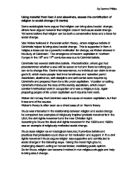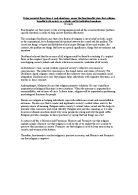Using material from item A and elsewhere, assess the contribution of religion to social change (18 marks)
By Gemma Phillips
Using material from item A and elsewhere, assess the contribution of religion to social change (18 marks)
Some sociologists have argued that religion can bring about social change; others have argued however that religion does in fact cause social change. Yet some believe that religion can be both a conservative force and a force for social change.
Max Weber believed in the social action theory, where religious beliefs of Calvinists helped to bring about social change. This is supported in item A ‘religious ideas can be a powerful motivation for change, as Weber showed in his study of Calvinism.’ The emergence of modern capitalism in Northern Europe in the 16th and 17th centuries was due to Calvinist beliefs.
Calvinists had several distinctive beliefs. Predestination, where god had predetermined whether a soul will be saved or not and there is nothing you can do to change this. Devine transcendence, no individual can claim to know god’s ill, which made people feel inner loneliness and ‘salvation panic’. Asceticism, abstinence, self-discipline and self-denial were required by Calvinist’s and prepared them for a life under capitalism. Vocation or calling, Calvinist’s introduced the idea of this worldly asceticism, which meant constant methodical work in occupation and was a religious duty. Again preparing people of life under capitalism as it requires hard work.
Weber did not say that Calvinism was the cause of modern capitalism, but that it was one of the causes.
Weber’s theory is often seen as a direct assault on Marx’s theory.

This is a preview of the whole essay
Peer Reviews
Here's what a star student thought of this essay
Quality of writing
There are a few noticeable spelling mistakes in this essay, such as “devine” instead of “divine”, but the thing that really needs to be altered are the mistakes when discussing the key ideas – for instance they mention “social chance” instead of “social change” and “liberal theology” instead of “liberation theology” which could have been corrected with a proof read. There a few grammatical issues, such as the writer discussing views of “Calvinist’s” rather than “Calvinists” – the apostrophe here is not needed.
Level of analysis
Key terms are used very well in context, such as “predestination”, “asceticism” and “civil rights movement”. Key theorists are also well explained like Engels, Parsons and Gramsci, but the writer should state which branch of sociological theory they are concerned with, for instance Parsons is a Functionalist, which reflects his evolutionary view on religion and social change. The candidate makes good use of sociological evidence though which will gain them lots of “understanding” marks. For example they state, “Billings (1990) did a study on religion and class conflict - which was the Case of Coalminers and textile workers in Kentucky”, which shows that they know what the examiner wants, as they explain rather than just state facts.
Response to question
The introduction is on the whole pretty good: it’s concise and gives a real indication that the writer will be answering the specific question set. However it could be improved by actually mentioning the branches of sociological theory that are associated with what they’re saying, for example they could say “Marxists believe that religion can be both a conservative force and a force for social change” instead of simply “some believe”. This would just instantly signpost to the examiner that the candidate has good sociological knowledge and understanding. The conclusion is good, but the main body of the essay could be better structured – more detailed paragraphs are needed, for example when it says, “Gramsci sees religion having a dual character and he notes that in some cases it can challenge and support the ruling class”, this could be added to the end of a paragraph to gain evaluative marks. Larger paragraphs would make this essay flow more.







